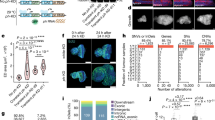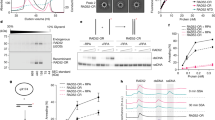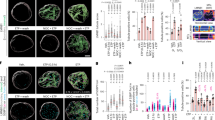Abstract
Cells that lack PARP-1 activity are limited in their ability to repair DNA single strand breaks and respond to DNA damage with a strong accumulation of p53 and enhanced rates of apoptotic cell death. We have generated combinatorial mutant mice that both lack p53 and PARP-1 activity due to the expression of a dominant negative PARP-1 allele targeted to T-cells by the lck promoter. Here we report that these double mutant mice develop T-cell lymphoma at a significantly reduced latency period compared to single p53 null mice that are already cancer prone. We demonstrate that the absence of p53 does not only protect T-cells from lck-PARP-DBD transgenic mice from apoptosis but also abrogates the DNA damage induced cell cycle arrest in the G1 phase. T-cells from double mutant mice continue to proliferate after the induction of DNA strand breaks, are limited in their DNA repair capacity and cannot be eliminated by apoptosis. These results indicate that PARP-1 and p53 cooperate in the suppression of tumorigenesis by maintaining genomic integrity after DNA damage through the activation of a G1/S cell cycle checkpoint the initiation of DNA repair and the induction of cell death.
This is a preview of subscription content, access via your institution
Access options
Subscribe to this journal
Receive 50 print issues and online access
$259.00 per year
only $5.18 per issue
Buy this article
- Purchase on Springer Link
- Instant access to full article PDF
Prices may be subject to local taxes which are calculated during checkout




Similar content being viewed by others
References
Althaus FR, Hofferer L, Kleczkowska HE, Malanga M, Naegeli H, Panzeter PL, Realini CA . 1994 Mol. Cell. Biochem. 138: 53–59
Beneke R, Geisen C, Zevnik B, Bauch T, Müller WU, Küpper JH, Möröy T . 2000 Mol. Cell. Biol. 20: 6695–6703
Conde C, Mark M, Oliver FJ, Huber A, de Murcia G, Menissier-de Murcia J . 2001 EMBO J. 20: 3535–3543
Dantzer F, de La Rubia G, Menissier-De Murcia J, Hostomsky Z, de Murcia G, Schreiber V . 2000 Biochemistry 39: 7559–7569
Darzynkiewicz Z, Bruno S, DelBino G, Gorzyca W, Hotz MA, Lassota P, Traganos F . 1992 Cytometry 13: 795–808
de Murcia G, Menissier de Murcia J . 1994 Trends Biochem. Sci. 19: 172–176
de Murcia JM, Niedergang C, Trucco C, Ricoul M, Dutrillaux B, Mark M, Oliver FJ, Masson M, Dierich A, LeMeur M, Walztinger C, Chambon P, de Murcia G . 1997 Proc. Natl. Acad. Sci. USA 94: 7303–7307
Deppert W . 1994 Semin. Cancer Biol. 5: 187–202
Donehower LA, Harvey M, Slagle BL, McArthur MJ, Montgomery Jr CA, Butel JS, Bradley A . 1992 Nature 356: 215–221
Enoch T, Norbury C . 1995 TIBS 20: 426–430
Hassa PO, Hottiger MO . 1999 Biol. Chem. 380: 953–959
Jacks T, Remington L, Williams BO, Schmitt EM, Halachmi S, Bronson RT, Weinberg RA . 1994 Curr. Biol. 4: 1–7
Jackson SP . 1996 Curr. Opin. Genet. Develop. 6: 12–25
Jeggo PA . 1998 Curr. Biol. 8: R49–R51
Joshi VV, Frei JV . 1970 J. Natl. Cancer Inst. 44: 185–208
Karsunky H, Geisen C, Schmidt T, Haas K, Zevnik B, Gau E, Möröy T . 1999 Oncogene 18: 7816–7824
Krammer PH . 2000 Nature 407: 789–795
Küpper JH, de Murcia G, Bürkle A . 1990 J. Biol. Chem. 265: 18721–18724
Küpper JH, Müller M, Bürkle A . 1996 Cancer Res. 56: 2715–2717
Küpper JH, Müller M, Jacobson MK, Tatsumi-Miyajima J, Coyle DL, Jacobson EL, Bürkle A . 1995 Mol. Cell. Biol. 15: 3154–3163
Lakin ND, Jackson SP . 1999 Oncogene 18: 7644–7655
Levine AJ . 1997 Cell 88: 323–331
Lindahl T, Satoh MS, Poirier GG, Klungland A . 1995 TIBS 20: 405–411
Liu L, Allay E, Dumenco LL, Gerson SL . 1994 Cancer Res. 54: 4648–4652
Molinete M, Vermeulen W, Bürkle A, Menissier-de Murcia J, Küpper JH, Hoeijmakers JH, de Murcia G . 1993 EMBO J. 12: 2109–2117
Möröy T, Grzeschiczek A, Petzold S, Hartmann KU . 1993 Proc. Natl. Acad. Sci. USA 90: 10734–10738
Müller M, Wilder S, Bannasch D, Israeli D, Lehlbach K, Li-Weber M, Friedman SL, Galle PR, Stremmel W, Oren M, Krammer PH . 1998 J. Exp. Med. 188: 2033–2045
Newton K, Strasser A . 2000 J. Exp. Med. 191: 195–200
Oliver FJ, Menissier-de Murcia J, Nacci C, Decker P, Andriantsitohaina R, Muller S, de la Rubia G, Stoclet JC, de Murcia G . 1999 EMBO J. 18: 4446–4454
Oren M . 1999 J. Biol. Chem. 274: 36031–36034
Panzeter PL, Zweifel B, Malanga M, Waser SH, Richard M, Althaus FR . 1993 J. Biol. Chem. 268: 17662–17664
Samper E, Goytisolo FA, Menissier-de Murcia J, Gonzalez-Suarez E, Cigudosa JC, de Murcia G, Blasco MA . 2001 J. Cell. Biol. 154: 49–60
Schreiber V, Hunting D, Trucco C, Gowans B, Grunwald D, De Murcia G, De Murcia JM . 1995 Proc. Natl. Acad. Sci. USA 92: 4753–4757
Sentman CL, Shutter JR, Hockenbery D, Kanagawa O, Korsmeyer SJ . 1991 Cell 68: 879–888
Sofer-Levi Y, Resnitzki D . 1996 Oncogene 13: 2431–2437
Tong WM, Hande MP, Lansdorp PM, Wang ZQ . 2001 Mol. Cell. Biol. 21: 4046–4054
Trucco C, Oliver FJ, de Murcia G, Menissier-de Murcia J . 1998 Nucleic Acids Res. 26: 2644–2649
Tsutsumi M, Masutani M, Nozaki T, Kusuoka O, Tsujiuchi T, Nakagama H, Suzuki H, Konishi Y, Sugimura T . 2001 Carcinogenesis 22: 1–3
Van Meyel DJ, Sanchez-Sweatman OH, Kerkvliet N, Stitt L, Ramsay DA, Khokha R, Chambers AF, Cairncross JG . 1998 Int. J. Oncol 13: 917–922
Walczak H, Krammer PH . 2000 Exp. Cell. Res. 256: 58–66
Wang ZQ, Auer B, Stingl L, Berghammer H, Haidacher D, Schweiger M, Wagner EF . 1995 Genes Dev. 9: 509–520
Acknowledgements
This work was supported by a grant from the Deutsche Forschungsgemeinschaft (Mo 435/9-3), the IFORES-Program of the University of Essen Medical School and the ‘Fond der chemischen Industrie’.
Author information
Authors and Affiliations
Corresponding author
Rights and permissions
About this article
Cite this article
Beneke, R., Möröy, T. Inhibition of Poly(ADP-ribose) polymerase activity accelerates T-cell lymphomagenesis in p53 deficient mice. Oncogene 20, 8136–8141 (2001). https://doi.org/10.1038/sj.onc.1205056
Received:
Revised:
Accepted:
Published:
Issue Date:
DOI: https://doi.org/10.1038/sj.onc.1205056
Keywords
This article is cited by
-
Loss of poly(ADP-ribose) polymerase-2 leads to rapid development of spontaneous T-cell lymphomas in p53-deficient mice
Oncogene (2010)
-
Poly(ADP-ribose) polymerase-1 plays a role in suppressing mammary tumourigenesis in mice
Oncogene (2007)
-
Mouse models with modified p53 sequences to study cancer and ageing
Cell Death & Differentiation (2003)



